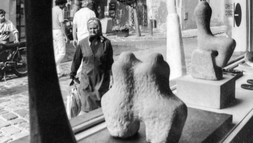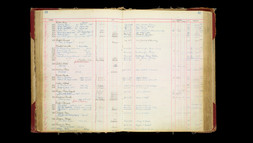Institute of Philosophy and Art History
The institute consists of two departments: philosophy and art history.
Since the winter semester 2016/17, the Faculty of Humanities and Social Sciences has established a DFG Research Training Group, "Cultures of Critique. Forms, Media, Effects", in which the IPK is significantly involved (speaker: Prof. Dr. Beate Söntgen).
The Institute is also represented at the Leuphana Institute of Advanced Studies for Culture and Society (co-director: Prof. Dr. Susanne Leeb) and is significantly involved in the Center for Critical Studies (speaker: Dr. Ben Trott).
With the Lichtenberg Professorship (Prof. Dr. Lynn Rother), funded by the Volkswagen Foundation, Leuphana University has the first permanent full professorship dedicated entirely to questions of provenance research, looted art, and restitution.
The Kunstraum, which is connected to the Institute of Philosophy and Art History, offers a close practical connection to contemporary art and its actors.
Professorship of Philosophy, especially continental philosophy
Prof. Dr. Roberto Nigro
Professorship of “Philosophy of the Present”
N.N.
(Administrative Professor: Dr. Maria Teresa Costa)
Professorship of Art History
Prof. Dr. Beate Söntgen
Professorship of Provenance Studies
Prof. Dr. Lynn Rother
Professorship of Contemporary Art
Prof. Dr. Susanne Leeb
Junior Professorship of Cultural Theory
N.N.
Junior Professorship of Transcultural Art History
Vera Simone Schulz
IPK members primarily teach in the Bachelor programs “Cultural Studies” (Art and Visual Culture focus), "Cultural Studies: Organization, Society, and the Arts", "Digital Media" and "Studium Individuale", the “Philosophy” BA-Minor and the Museum Studies BA-Minor, in the MA programs “Critical Studies: Arts, Theory, History”, and “Cultural Studies: Culture and Organisation” as well as in the PhD program.
Cultural Studies BA
Cultural Studies BA: Art and Visual Culture focus
Cultural Studies BA: Cultural and Social Theory focus
Bachelor Cultural Studies: Organization, Society, and the Arts
Bachelor Digital Media
Philosophy BA-Minor
Museum Studies BA-Minor
MA Critical Studies: Arts, Theory, History
MA Cultural Studies: Culture and Organization
“Cultures of Critique” DFG Research Training Group
Current projects
Modern Migrants: Paintings from Europe in US Museums (Volkswagen Foundation)
"Intervening Arts": Artistic Way of Life as Intervention (DFG Collaborative Research Centres)
Provenance and Collection Research Digital - Subproject: PAESE 3.0 (funded through zukunft.niedersachsen)
Provenance Lab (Volkswagen Foundation)
Leuphana Institute for Advanced Studies (LIAS) in Culture and Society
Center for Critical Studies
Archipelago Lab
(Un)Mapping Infrastructures: Transnational Perspectives in Modern and Contemporary Art
Completed projects
Research Training Group “Cutures of Critique” (DFG-GRK 2114)
Lena Meyer-Bergners sozial-transformativer Moderne-Begriff in den globalen gesellschaftlichen Umbrüchen der ersten Hälfte des 20. Jahrhunderts (DFG Project)
Wendländisches Leinen und Koloniales Erbe. Spurensuche einer transkulturellen Verflechtung im 18. und 19. Jahrhundert (Pro*Niedersachsen – Kulturelles Erbe – Forschung und Vermittlung in ganz Niedersachsen)
Jameson 2.0. Cognitive Mapping in Contemporary Art (Project within DFG Priority Program “The Digital Image”)
The exhibition Les Immatériaux: Interdisciplinarity, Epistemology, Curatorial Subjects (DFG Research Grants)
Elements of a Critical Theory of Media and Participation (Project within DFG Research Units ”Media and Participation. Between demand and entitlement”)
Participatory Critique as Transforming and Transversal "With" (Project within DFG Research Unit ”Media and Participation. Between demand and entitlement”)
Anderes Wissen in künstlerischer Forschung und Ästhetischer Theorie (DFG Scientific Network)
PriMus – PhD in Museums (funded by the Federal Ministry of Education and Research and the VDI/VDE Innovation + Technik GmbH)
Leuphana Arts Program (MWK Lower Saxony Ministry of Science and Culture)


![[Translate to Englisch:] Kunstraump2p_Disborderly_Sudabe Yunesi](/fileadmin/_processed_/3/3/csm_nothingisyourfault_e6d702dd70.jpg)



